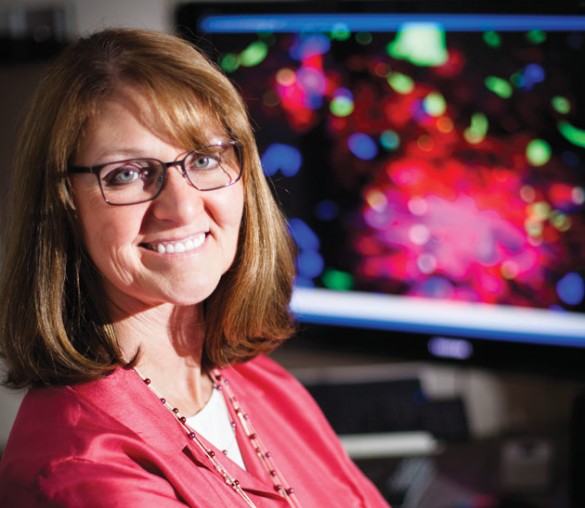
Perhaps the most challenging aspect of being the physician of a patient with Alzheimer’s disease is that there’s nothing positive to offer. For now, there are no proven therapies and no known cures.
Laura Dugan says that a patient’s inability to know what’s happening and plan for the future also is difficult.
“Lack of insight is part and parcel with this disease process,” she said. “Frequently, those with memory impairment don’t realize it, and it makes it very difficult to have a dialogue with them about important things—such as getting finances in order or trusting a relative to manage their health care.
“You can have a dialogue if a patient has cancer. Most people want to know what they need to do, what their chances are of being cured, and what this means for their family,” she said. “But if you don’t understand that you have a disease, you don’t think you need to have these discussions.”
Dugan joined the Vanderbilt faculty to direct the Division of Geriatric Medicine within the Department of Medicine. A neuroscientist, she brings a robust research program studying the cellular mechanisms of nerves and neuronal injury in the brain, and the role of inflammation in the aging brain and in the development and progression of neurodegenerative diseases, such as Alzheimer’s.
She comes to Vanderbilt from the University of California–San Diego, where she led a division of geriatrics ranked 20th in the nation by U.S. News & World Report out of more than 1,500 programs. Before that, she was at Washington University for 11 years.
Dugan was attracted to Vanderbilt because of its “sterling” neurosciences research reputation and strong clinical and research geriatrics program. Combined with Vanderbilt’s strength in genetics, bioinformatics and personalized medicine, she sees great things ahead in the institution’s contributions to geriatric medicine.
“[rquote]I have a strong interest in bringing neuroscience and aging together, and Vanderbilt is a great place to bring this vision into existence,” she said.[/rquote] “Vanderbilt fosters outstanding neuroscience research in the broadest sense: psychiatry, psychology, neurology and the Vanderbilt Brain Institute. Studying Alzheimer’s and other degenerative diseases provides vital data, but understanding the brain as it ages may give us additional ways to keep older adults healthy.”
Dugan also will see inpatients on VUMC’s Acute Care for the Elderly unit and looks forward to collaborating with Nashville’s Abe’s Garden, an Alzheimer’s and memory care facility named for Abram Shmerling, whose chair she holds.
View the complete list of new university faculty for 2014-15.
View the complete list of new medical faculty for 2014.